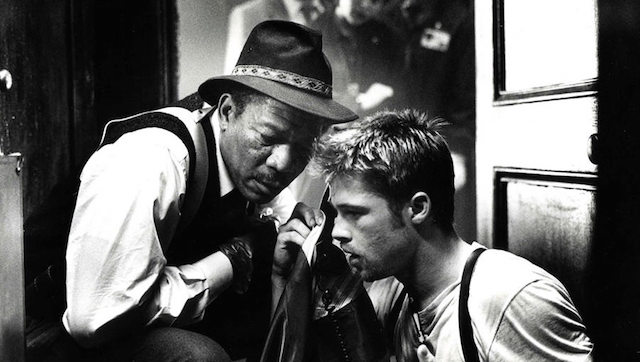Twenty-five years since its release, Seven remains a cult classic because it inspired many copy-cat clichés in cinema, and launched several careers.
On the dusty, scarred hard drives of India’s college-going kids from the first decade of the 21st century, two films stood apart from the rest. To the Hindi speaking viewers from India, only just beginning to explore the virtues and vices of a broadband connection (read: torrents) they were a sort of initiation into the world of quality, but most importantly stylistic, cinema. One of these films is The Shawshank Redemption (1994). The other iss David Fincher’s Seven (1995), a grotesque portrayal of sin and the pervasiveness of evil. Twenty-five years since its release, Seven remains a cult classic because it inspired many copy-cat clichés in cinema, and launched several careers.
It’s perhaps only coincidence that Morgan Freeman played a worn sage in both Seven and the Shawshank Redemption, overlooking the psychological transformation of younger men around him. Seven is nightmarish because it’s set in an unnamed city where it always pours and it could be the 90s but it is hard to tell, looking at the film. It’s as if this sketch of urban grimness can teleport itself to whatever nook of the world you are watching it from, and claw into the sewers like your worst fears. Violence follows life. And naturally, life follows violence. Freeman plays Lt. Somerset, a retiring detective on the last day of his job, when an absurdly brutal case presents itself. Somerset is assisted by Mills, a less than dapper Brad Pitt, evidently trying to shake his sex icon image. While Freeman is old school – he uses a typewriter, reads in the library and thinks before speaking – Mills is tenacious and on the edge. It’s almost as if Mills is what justice would look like in the hands of future generations – rushed and hot-headed.
After the two detectives find a man murdered by forced feeding they realise there is a pattern to the gruesome murders surfacing by the numbers, in the city. The murderer conveniently leaves clues intended for the detectives. Not because he wants to be caught, but because both detectives, as we learn later, are part of his masterpiece. Both Mills and Somerset, are of course, polar opposites. While the former follows his instincts, the latter trusts his knowledge and restraint. Because this a cruel world, neither is particularly happy, nor are the two without hope. Mills has a wife (Gwyneth Paltrow) he struggles to give time to, while Somerset is a lonesome, middle-aged man, with all the time in the world to reminisce about all that is decaying around him.
In Seven, Fincher’s cynical world view grabs you by the throat and pushes you against the wall. To look away is not an option because the director encloses us in a world from which there is no escape. Even Seven’s solitary chase sequence happens inside the confines of an apartment building. “There are times when you just can’t see anything. I like that kind of movie,” Fincher once said in an interview with The Guardian. The limits of space and our inability to shake an impending sense of dread are characters in the film. But Seven is gory without actually showing any blood, it suggests but doesn’t descend into farcical bloodshed. Fincher builds his vision of hell more deftly, draining both light and optimism from his screen. The only time we see anything close to a bright horizon is in the shocking climax.
Fincher’s film is iconic for more than just its nightmarish vision of a fictional (could be yours) city from hell. Besides its stylish portrayal of a forbidding reality, it claims that sin is ultimately inevitable. The twist at the end is his way of confirming that given the right motivation, even custodians of law and justice can choose vengeance.
Seven has earned cult status for an array of reasons. Kevin Spacey’s uncredited cameo as the killer ‘John Doe’ is stupendously chilling. The film recast Brad Pitt as a “proper actor” and earned Fincher the pedigree to attract studio backing. Seven may never grow old, because cynicism never grows old.
Find latest and upcoming tech gadgets online on Tech2 Gadgets. Get technology news, gadgets reviews & ratings. Popular gadgets including laptop, tablet and mobile specifications, features, prices, comparison.

